Can We Trust Commander Lawrence in 'The Handmaid's Tale'?
Warning: This article contains spoilers for 'The Handmaid's Tale' season 5 episode 6 'Together,' which aired October 12, 2022.
Writers talk a lot about creating three-dimensional characters. We'll have imaginary conversations with them, sit down with them, and try to understand who they are. They can't just be good guys or bad guys, and they can't be based on a single personality trait. They should live within the nuance, just like people in the real world. But readers don't want nuanced characters. That's not how humans think. They puzzle us. We'll spend hours trying to figure them out and categorize them, bashing a square peg into a circular hole. Writers compensate by becoming portrait painters, fixing crooked noses, adding in a touch of beauty or malice--something the readers can use to find out which label they deserve.
If most writers are painters, 'The Handmaid's Tale' was created by photographers. They don't care about good or bad. They give us reality, and they tell us to take it or leave it. That's exactly what they did with Commander Joseph Lawrence. He is guilty of horrific crimes, but there's more to him--infinite shades of light and dark, and his intentions aren't easy to understand. He always seems to be on the fence, playing the field--lying and scheming, but for what? What does Joseph really want? Can we trust him?
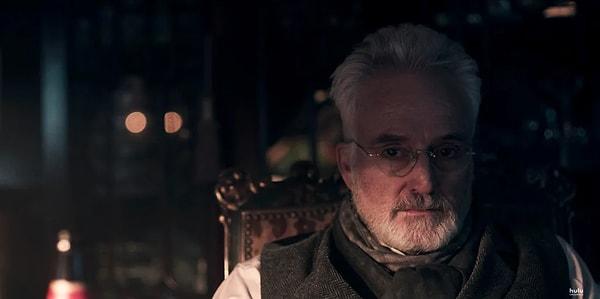
Courtesy of Hulu
What Does Joseph Lawrence Actually Believe?
For many of us, our first introduction to Joseph was in the months leading up to the season 2 premiere. It was an exciting time. We were finally going to see what happened after the book's infamous climax. This was decades in the making, and they kept throwing surprises at us, little clues. They never told us anything of substance, but we kept checking anyway.
Bradley Whitford was the strangest clue of them all. He was framed as a powerful commander who was difficult to read. It was frustrating. Commanders were supposed to be evil, sexual deviants that beat their slaves and their wives. It didn't seem like there could possibly be room for shades of gray. But as we've come to find out, 'The Handmaid's Tale' creators have become the masters of finding room for shades of gray.
When he was introduced in season 2, it was easy for us to assume that he was good. He had nude art and contraband all over the place. Lydia couldn't stand him, and he didn't like her either. He wouldn't even use Gilead's signature greetings. He just wanted her out of his house. He didn't seem like a believer at all. He certainly wasn't a part of Gilead's culture, but that didn't necessarily make him a good person. That kind of black-and-white thinking didn't seem to fit.
The mixed signals started coming right away, and they didn't stop. He threatened his handmaid with a beating, making it impossible to tell if he was joking or not. He threatened Emily for looking at a book in his sitting room, talking about the good old days when they used to take a hand instead of a finger. He seemed to be having fun with himself, but it was mostly at everyone else's expense. He'd listen to contraband music--some of it with blatant drug references. He refused to do the ceremony. He even gave Emily a drink of alcohol, pouring her a tiny glass while he talked about how he valued privacy in his home.
His attitude was that of a drunk: belligerent, playful, and vulgar--always sarcastic and dark. He did seem to enjoy drinking, a habit that we've seen quietly play out over the years. Apparently, he had great scotch. We learned that he built the colonies. But as bad as that way, it didn't seem to determine who he was. We still couldn't understand him, and there seemed to be something else there. But what? Our first clue was his unorthodox beliefs. Refusing to do the ceremony might not seem like much to the viewer, but it was Gilead's sacred rite, the pillar of their faith. It was how they planned on saving humanity, and he was taking a very serious risk in avoiding it. He could easily have been punished, even if he was the architect of their economic system. That was never explained in season 2, but we did see him help Emily, Nichole, and June.
At the beginning of season 3, when he saw that June had stayed behind, he offered to take her to the border. He even took June to get Hannah--something nobody else had ever done. Some entertained the thought that he might be trying to make up for creating the colonies. His machination was so disturbing, it drove his wife Eleanor even deeper into the pits of madness. She could barely live with the thought of all of those people digging up the poisoned dirt. He had an amazing poker face, so it was hard to tell if he felt the same way. But he clearly felt some sort of attachment to his wife. He tried to shield her from what was happening when he snatched Emily out of the house to release her.
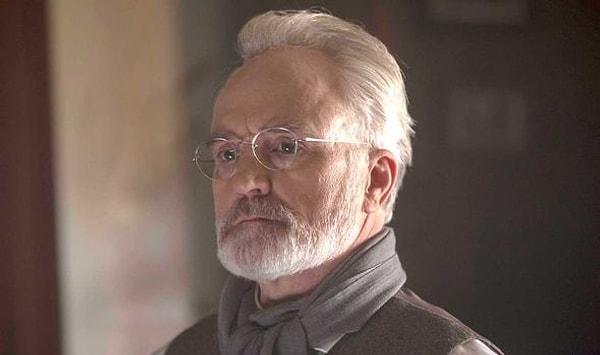
Courtesy of Hulu
When Emily escaped, and Joseph drove June to the MacKenzies, it felt like we'd finally gotten our answer. He was a good man--a strange man, but good. He seemed to care. Nobody else was willing to go so far as to show up at the MacKenzie's house. Even Nick wouldn't have done that. It was too dangerous. But Joseph wasn't just willing to help; he was ballsy about it, nonchalantly so. He treated the whole thing like he was giving someone a ride.
He moved June into his home, and all convention seemed to fall away. There was no blessing of the fruit and avoiding eye contact. She saw it as a modern, casual environment where she could speak freely, and in many ways she was right. She was allowed to move about the house. She helped out the marthas in the kitchen. She didn't have to pretend to be a believer or watch what she said to Joseph. It didn't feel like Gilead. Nobody was playing the part.
Early on we found out that the marthas were running their network out of the house. But that came with caveats. Joseph was kept out of the loop. It was a hear no evil see no evil type of situation. He knew what was going on. They just didn't want to tell him much about it. His one-eyed martha said that things were done a certain way, meaning that the commander had his quirks just like the rest. It wasn't all fun and games. She actually seemed scared of him. When he dragged her away for lying, June knew something was wrong. Her and the other martha Beth checked the wall and the hanging trees for her--nothing, but that didn't mean he didn't dispose of her somehow. They couldn't put it past him, and neither should we.
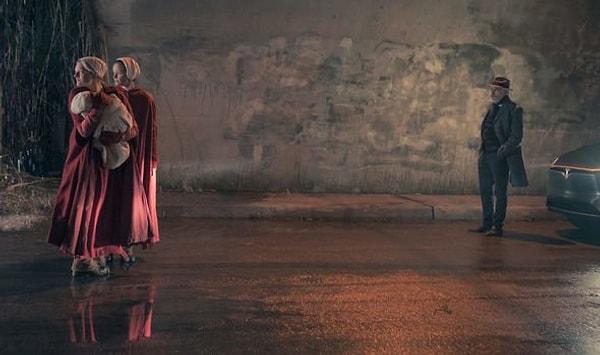
Courtesy of Hulu
Survival in Gilead is all about knowing the limits. In some situations, eye contact and body language could get a person shot. There was a way to act, but in the Lawrence household, all of those rules had been thrown out the window. June was living in an uncertain situation, and she didn't like it. That was too dangerous. She tried to approach Fred at a gathering to ask him about Joseph. She needed to know something, anything she could use. She wasn't just trying to figure out the rules, she also wanted to know how to manipulate Joseph. This man took her to Hannah's house. If she played her cards right, she might have been able to find a way out. Fred's response was terrifying. He said Joseph didn't like to get bored.
That evening, he had a fight with June. Their dynamic is different from that of other characters because they're both highly intelligent. They speak with cues, long pauses, and gestures, just as much as they speak with words. He knew that she was trying to work him, and it bothered him. He wanted to know why he should feel sorry for her or for anyone else. She angered him. She tried to say how difficult it must be to do paperwork, knowing that the numbers were real people. In a way it felt like she was grasping at straws, but she wasn't.
He got defensive, but his reaction was ambiguous, and he defended himself to play it off. He said it must be easy trying to invent the humanity in someone, pretending they have a conscience. That they care. He did care, though. He wanted her to understand that he was helping humanity, not just one person or a group of people, and certainly not individuals. He was trying to repopulate the world. He also wanted to understand the ramifications of that kind of work. It's an old moral conundrum. He made difficult decisions that hurt large groups of people, but in his mind, they were for the greater good.
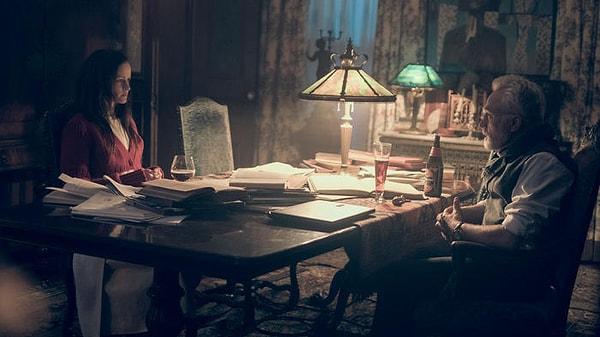
Courtesy of Hulu
In order to illustrate his point, Joseph decided to take June to the pens. The pens are just as terrifying as the colonies. It's the uncertainty--women packed into giant cages like cattle, reaching out to anyone walking through the rows, begging to know what was going to happen to them. They could be sent off to their deaths. They could be turned into marthas or handmaids. They didn't know, and the suspense had filled the air like the smell of their sweat and waste, which was no doubt noxious. Everyone they asked just walked by ignoring them. They wouldn't even say a word. In this case, their fates hadn't been determined, so nobody could tell them even if they wanted to. The women there were stuck in limbo.
Joseph wanted June to choose. She could pick a handful of women to be marthas, and the rest were going sent off to the colonies. Essentially he was saying that those were the kinds of choices you have to make when you're trying to save the world. It was sloppy logic. He chose to put them in the colonies that afternoon in an argument with Putnam. He said he needed workers, and in the grander scheme of things, none of this was necessary. They could've saved humanity with a different type of system. Commanders could've tried invitro fertilization. They could've passed laws banning coal and fossil fuels. They could've built volunteer surrogate rosters, where women could sign up to have kids for couples who wanted them. All they needed was a good marketing scheme and the support of the masses, both of which were well within reach. There were countless methods that would've worked. But the commanders chose to be ruthless. Joseph couldn't see that.
June couldn't choose who to spare. She refused. She couldn't even bear to be there. All of those women had heard his demands, and they were all looking at her with pleading faces. How could she do that? This is a pattern with Joseph. He shocks. He antagonizes. He slaps people in the face with his truth. But he doesn't think things through the way he should. He can't see past his way of doing things.
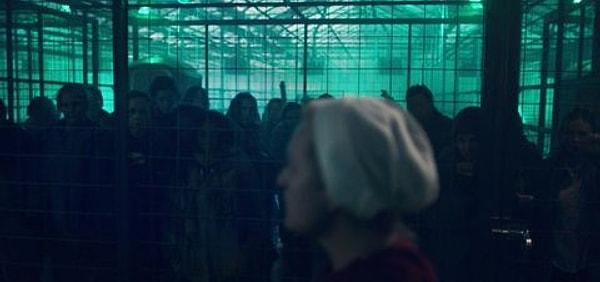
Courtesy of Hulu
We do know how Joseph got into this situation. In season 3, we got a look at some of the books he authored sitting on his bookshelf. The titles were very revealing. He wrote about how problematic populism--or the focus on human rights--was sending the economy into a downturn and undermining American institutions. He believed that it was making it difficult for them to address the fertility crisis. He was frustrated. He talked about the Brink of Extinction and global warming. But there were more books about economic growth, and he had come to the conclusion that there was a correlation between the religiosity of a nation and its prosperity.
He could be called a sociopolitical economist--someone who focuses on how society and governments affected a country's economic standing. Through academic research, he came to the conclusion that Gilead's way of life would save the human race from extinction. We know that he was right, of course. But it was not the only way. He must've had a reason for his blind spot. Perhaps his lack of religious beliefs caused him to take a look at the efficacy of religion as a means to control others. Control was definitely a central focus of his work, and he's spoken about it before.
Joseph was ideologically aligned with the Sons of Jacob. He was not religious, but he was a true believer, and he was just as blind as Aunt Lydia, Serena, or Fred. He believed that his fascist methodology was the only way. He had no other choice but to play with lives because that was what it was going to take to save humanity. It was a form of fanaticism, and it led him to do terrible things. He had everyone--from sea to shining sea--living with the threat of death camps over their heads--afraid to flinch and make eye contact. Gilead would find a reason when they could, even if it was just to erase mouths to feed, all because Joseph Lawrence couldn't think of another way. What we saw in the pens was Joseph's pathology, not a harsh truth.
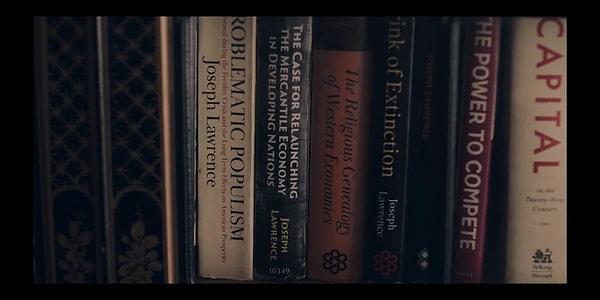
Courtesy of Hulu
People Are Not Equations
Joseph thought he had everything squared away. He ran the numbers. He did his research, and he knew that he was right. But just like any fanatic, there were things that he refused to see. His problem was that he preferred to look at the individual as it related to the whole, not on a personal level. He didn't think that people mattered, but he had someone that he loved. That would have to come out at some point.
On September 14, when the show premiered Bradley Whitford, who plays Commander Lawrence, did a press racket with Max Minghella, who plays Nick. They went from one vlog to the next, moving between popular influencers to even more popular publications, answering questions about the show.
In every interview, Whitford talked about how June 'fanned the flame of decency' in Joseph. That was the magic of her character, and he was right. She brought it out in every true believer she got close to, even Serena and Lydia to a certain extent. She finds their weak spots: Serena's maternal instincts, her desire to work, and her hatred for Fred; Aunt Lydia's sense of compassion, her sense of purpose, and her loyalty to the hypocritical regime; for Lawrence, it was Eleanor, and his complete refusal to see people as more than just numbers. He dug his nose into his files. He stayed inside, and he kept his wife in her room.
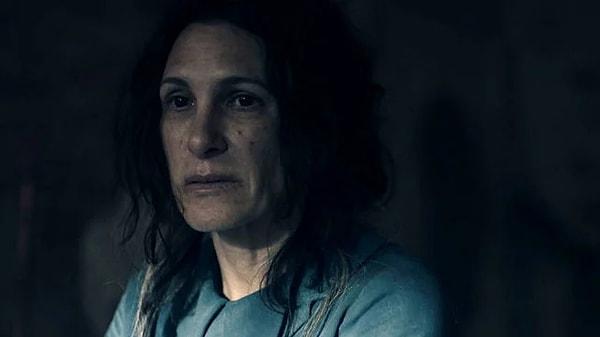
Courtesy of Hulu
Eleanor wasn't going to let him forget what he had done. He was the master of the modern gulag. She showed up at random to tell Emily about it. She yelled at him, saying that he knew what he had done. She probably stuck with it, throwing it in his face at every opportunity. Who could blame her? Perhaps that's why Joseph let Emily go. She was a victim of the colonies. Maybe that was his way of making up for his crimes.
He couldn't hide from them. He had many forces--not just June, but Gilead itself, the commanders, and the outside world--invading his walls, reminding him that he was the architect of an unspeakable atrocity. He'd destroyed the land of freedom. He seemed to be rebelling with all of his naked art and his songs about getting high. He wanted to live the way he wanted to, but he couldn't do that--not with Eleanor, and definitely not with Gilead.
It's likely that his journey toward redemption started before June arrived. But she planned on making sure he saw it to the end. She would come at him with it, spitting it in his face, rubbing his nose in it. She said the worst things at the best times. She did not care, because she knew that if she pushed Joseph hard enough he would help her.
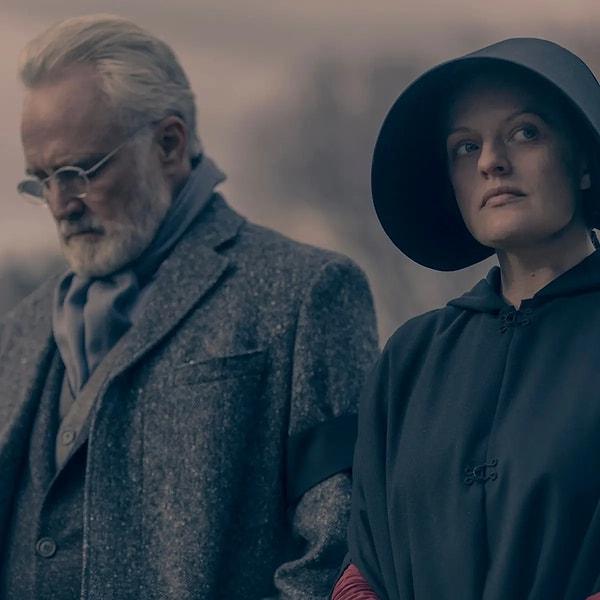
Courtesy of Hulu
It did not take much for Joseph to cave. Eleanor needed mental health treatment, and a random pile of meds lying around wasn't going to do the trick. She was delusional and sometimes violent, and he loved her dearly. After a few conversations with June, he was all in. He would get a truck, send June to the border, and June would make sure that Eleanor got out safely. Unfortunately, that did not happen. Eleanor killed herself, and June was forced to stay behind.
In Bradley Whitford's interviews, he spoke about how Eleanor's death had changed him. It made him see the light, and it also made him lose a lot of his will to live. Joseph was almost to the point where he was suicidal. He also thought that the commanders were going to kill him after Angel's Flight, and facing death can change a person. People become less cautious. They take fatal risks. In Joseph's case, it made him play fast and loose.
It comes out quite a bit in season 5. His drunken sarcasm is our constant companion in Gilead. He will say whatever he wants and do whatever he wants. There's hardly any pretense. He'll openly refuse to marry. He berated the commanders when Serena came up with the idea for Fred's funeral, telling them that he was tired of them squandering opportunities. He goes at it with Putnam more than once, making fun of Putnam's amputation and his affair with Janine. Putnam accused him of not following their way of life, and he was right. Joseph never has and ultimately never will follow Gilead--not in heart, at least. But he is devoted to the country, and Whitford says he's dedicated to changing things from the inside.

Courtesy of Hulu
Good Intentions
Good people in Gilead don't survive. They end up doing something stupid, saying the wrong thing, or letting their true intentions show. Nonbelievers have to hide their thoughts and pretend they're smiling for the surveillance camera. This is especially the case with people in power.
In Gilead, reputation is everything. It determines your rank, your social status, and also your economic status. Commanders have to convince everyone that their hearts are in it. They're models for the way the econo-people and everyone else should live--a shining example of righteousness. That means that they have to keep up a bullet-proof facade, and behind closed doors, they have to be able to play the game right. There's a way to be with other commanders. You have to laugh at their sickening jokes, talk about how sexy the handmaids are, put up with the smell of their cigar smoke, and you need to maneuver yourself politically--align yourself with the right people and the right ideas. Sometimes that means sacrificing your morals to get people to vote on your proposals.
Joseph knows this game, and he knows he has to play it well if he wants to accomplish his goals. To viewers, he's confusing. It's easy to understand why people are so distrustful of him. He was probably the one who brought Hannah to June when she was in prison, where they threatened to hurt her. He's given some disgusting speeches about handmaids, and he comes off as the type of person who does things for selfish reasons. But according to Bradley Whitford, he's doing it because he wants to reform Gilead for the sake of Eleanor, not because he wants to survive. He doesn't care if he survives. There's no selfishness there. He lives for his country, very literally, and the way he acts--let's be very clear, that is what it takes to survive. He has to look like a team player. He is a leader in a republic. He can't get other commanders to vote for his proposals if he acts like a dissident and calls them out on things. That's a good way to get killed, and he has to be consistent. He needs to eat, sleep, and drink that sickening good ol' boy vibe. People could talk if he changes things up. So he puts up a facade. He acts like one of the fellas, and he doesn't stop. He pretends to be that person no matter what situation he is in or who he is with.
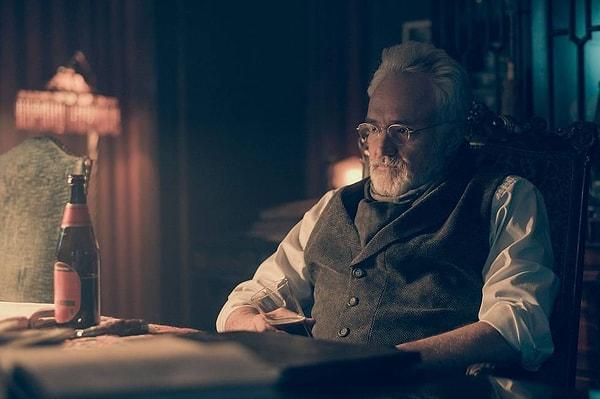
Courtesy of Hulu
The Plan
Joseph has a strange-backhanded communication style and a toolkit of manipulation tactics, all of them difficult to decode. He keeps his cards close, often using reverse psychology, outright lies, and provocation to get what he wants out of people. He's so quick and cunning about it, we don't even realize what he's done until after the scene is over, and even then, we have to sit down and think about it. This has happened before with Lydia. She's a creature of emotion, and he knows that. He uses it against her.
In season 4, she accidentally jabbed Aunt Ruth with a cattle prod. It wasn't intentional, but she was furious because Ruth was laughing at her. So it was more of a Freudian slip. She came huffing into Joseph's office, terrified that he was going to terminate her, so he decided to use that as leverage. He gave her a lecture accusing her of being a sadist. He said it was OK. Everyone needed a hobby, but she needed to take her frustrations out on someone else. Then he handed her a picture of Janine who had just been recaptured in Chicago. She melted. She was never going to lay a finger on Janine, and she was so defensive that she seemed ready to prove herself against the accusations of sadism. It was genius. He muzzled her, and he made her think that it was her idea. That is how Joseph operates, and it's why the audience can't trust him. He looks predatory. He has that mocking half-smile. Every word he says is dripping with sarcasm, and he always has an ulterior motive. He might even seem sadistic himself at times. In a way he is, but it's just like he told Lydia: People don't like him. He has to get people to like him.
The problem is that Joseph is still blind. His goal is to create a softer Gilead, one that can be shown off to the public. He knows where their weak spots are, and he's trying to address them on some level. That's why he told Lydia to cool it. He wants to pull the human rights atrocities back behind the curtain so he can open Gilead up for diplomacy and trade. That's always been his main goal. He wants treaties and a competitive spot in the global political theater. He could make that happen. He's intelligent enough, and he knows what's required of them. But his entire premise is flawed, and it's obvious. He's putting his faith in a vicious beast, and that beast will swallow him up if he's not careful. Gilead cannot be redeemed. He can't save it. He can't make it safe or healthy. But he's devoted to the nation.
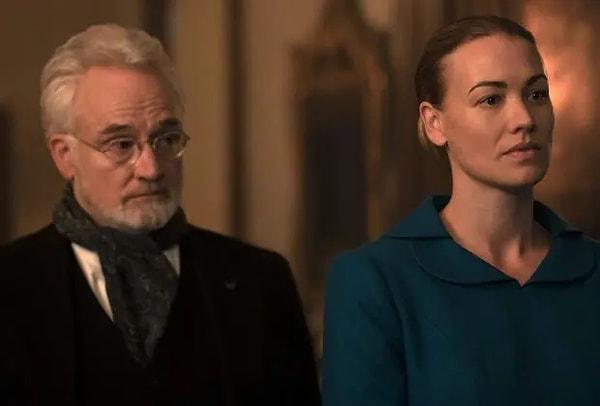
Courtesy of Hulu
Whenever we see Joseph's true intentions, it makes it even harder to trust him. He wants what's best for Gilead, and Gilead is inherently evil. He absolutely cannot change that; he will try, but it won't work. It's the misogyny, the fanaticism, the lack of human rights, and the slavery. Those Pandora's boxes cannot be closed. Leaders love slavery. Bad economists think it's the best thing since buttered bread. Forcing a country to give up free labor--especially in the home--is like forcing an addict to give up heroin. There are junkies who will hand over their needles sooner than a wife will give up her house slave. It will not happen, and Joseph isn't trying for comprehensive reforms. He's not going to make the country give up its worst issues. He's being realistic, toning things down, asking the aunts to be prudent with their cattle prods. He can't accomplish what needs to be done.
That is why his New Bethlehem project is doomed to fail. We saw Putnam talking about the idea before his death. He said Joseph wanted to bring back a bunch of terrorists, criminals, and traitors, welcome them back, coddle them, and forgive them. It was a twisted way to frame things, but it gave us what we needed. The idea is to build something resembling a normal space, where refugees can return to Gilead, unite with their families, and be productive members of society.
Joseph can't fix Gilead, so he's deluded himself into thinking that he can build a bubble. But that type of society cannot exist under the council's leadership. They devour places like New Bethlehem. There would be too much potential there, too many wombs, and too much sin. Even if it's just a small settlement, they'll blame all of their problems on the sinners they've decided to harbor within their borders. Any promise of freedom or safety would be violated before they break dirt, and it's a shame. He's doing this in honor of his wife. She deserves better than that.
Keşfet ile ziyaret ettiğin tüm kategorileri tek akışta gör!

Send Comment